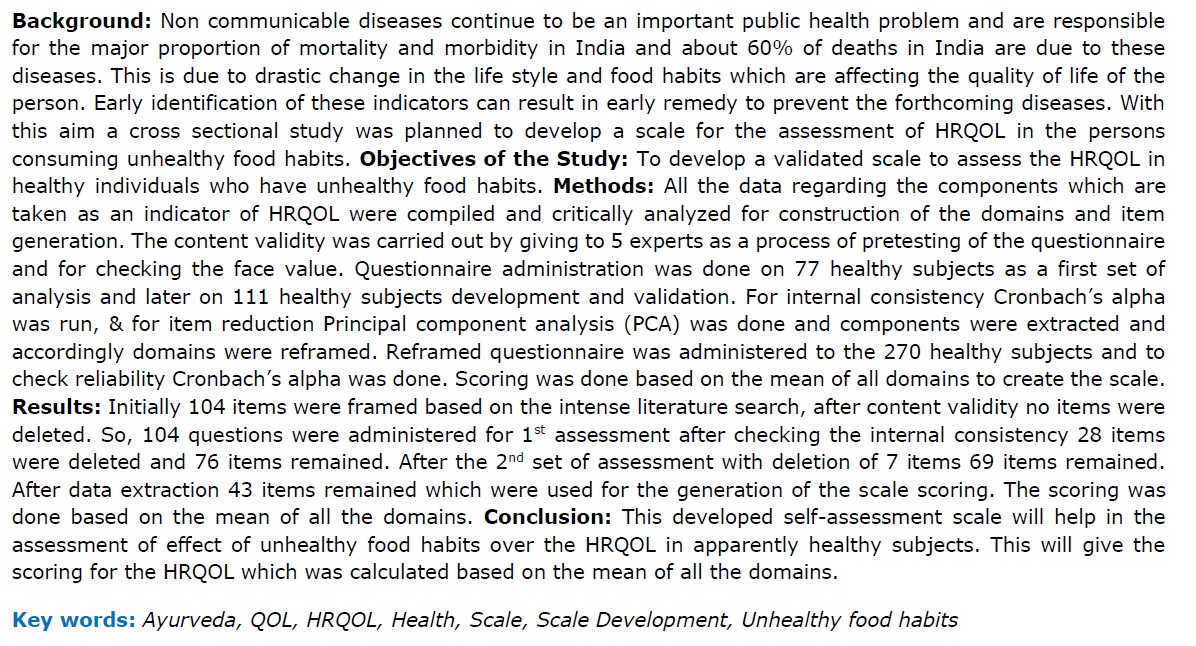A cross sectional study to develop a scale on health related QOL for assessing the effect of Unhealthy Food Habits in apparently Healthy Subjects
Keywords:
Ayurveda, QOL, HRQOL, Health, Scale, Scale Development, Unhealthy food habitsAbstract
Background: Non communicable diseases continue to be an important public health problem and are responsible for the major proportion of mortality and morbidity in India and about 60% of deaths in India are due to these diseases. This is due to drastic change in the life style and food habits which are affecting the quality of life of the person. Early identification of these indicators can result in early remedy to prevent the forthcoming diseases. With this aim a cross sectional study was planned to develop a scale for the assessment of HRQOL in the persons consuming unhealthy food habits. Objectives of the Study: To develop a validated scale to assess the HRQOL in healthy individuals who have unhealthy food habits. Methods: All the data regarding the components which are taken as an indicator of HRQOL were compiled and critically analyzed for construction of the domains and item generation. The content validity was carried out by giving to 5 experts as a process of pretesting of the questionnaire and for checking the face value. Questionnaire administration was done on 77 healthy subjects as a first set of analysis and later on 111 healthy subjects development and validation. For internal consistency Cronbach’s alpha was run, & for item reduction Principal component analysis (PCA) was done and components were extracted and accordingly domains were reframed. Reframed questionnaire was administered to the 270 healthy subjects and to check reliability Cronbach’s alpha was done. Scoring was done based on the mean of all domains to create the scale. Results: Initially 104 items were framed based on the intense literature search, after content validity no items were deleted. So, 104 questions were administered for 1st assessment after checking the internal consistency 28 items were deleted and 76 items remained. After the 2nd set of assessment with deletion of 7 items 69 items remained. After data extraction 43 items remained which were used for the generation of the scale scoring. The scoring was done based on the mean of all the domains. Conclusion: This developed self-assessment scale will help in the assessment of effect of unhealthy food habits over the HRQOL in apparently healthy subjects. This will give the scoring for the HRQOL which was calculated based on the mean of all the domains.
Downloads
References
Suzanne Nethan, Dhirendra Sinha, Ravi Mehrotra. Non Communicable Disease Risk Factors and their Trends in India. 18.7.2005; (DOI:10.22034/APJCP.2017):
Agnivesa. Rasayana Adhyaya, Pranakamiya Rasayanapada (chapter No-1), verse-3. In: Acharya Y T (editor). Charaka Samhita Chikitsasthana. Reprint ed. Varanasi: Chaukhamba Prakashan. 2013; p.381.
https://www.researchgate.net/publication/305462834_scale_development















